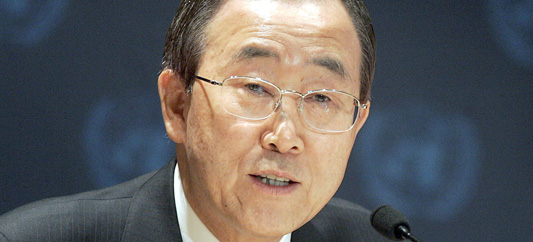Ban Ki-moon: Six months on
Mark Seddon examines the UN secretary-general’s first six months.

|
|
| The secretary-general has promised to make Africa his “number one priority” [EPA] |
He rises at 5:30am. He goes to bed at 1am or later. For the first time in six months he is about to take a week-long holiday, but that is only because some of his staff, half his age, risk burn-out unless they get to take a break.
Ban Ki-moon attributes his stamina to orange juice and ginseng.
| In Video |
Six months on from his inauguration as secretary-general of the United Nations, it is time however to ask whether all of those extra hours, those ever-burning lights on the 38th floor of UN headquarters on Manhattan’s East River are achieving results.
Does this most travelled of all secretary-generals have a consistent agenda? Can he act independently of the world’s only super-power, the United States, and his principal backer for the job?
To understand what makes Ban tick, it is important to observe him at close quarters as I have done over the past six months. And the best way to watch him in action is to travel with him and his entourage.
Relations
In Africa and the Middle East, I have watched as Ban takes leaders to one side, using every opportunity, even during short stop-overs in national capitals to squeeze more informal meetings into a packed day, to build up the personal relations that can really help to defuse crises.
Ban’s relationship with Bashar al-Assad, the president of Syria, is built on a trust that effectively means that the UN secretary-general may be one of the few world leaders who al-Assad speaks to directly in English.
Ban’s dealings with al-Assad may raise eyebrows on Washington’s Capitol Hill, but he sees Syria as a key component to any lasting Middle East peace and recently, while he told George Bush, the US president, that he would be travelling to Syria, there was never any chance that US state department disapproval would prevent him from going there.
| Others claim that Ban is more interested in preparing to run for the South Korean presidency in five years time |
Ban is open with the media, and has gone out of his way to accede to requests from Al Jazeera because he believes that it is vital for disseminating his message.
But, say critics, he has not been quite so open with some of his UN staffers.
There is open grumbling that Ban has surrounded himself on the 38th floor with too many Korean advisors – eight at the last count – and that Kim Won-Soo, his right hand man, is the real power in the building.
Others claim that Ban is more interested in preparing to run for the South Korean presidency in five years time, although claims that Kim and others will next year head back to Seoul to begin preparing the ground, are far-fetched.
Experiences
Some of Ban’s appointments have raised eyebrows, but the most powerful criticism is that Ban is too close to the US and that some of his pronouncements on the Middle East are not cognisant enough of international law and the UN’s position on the 1967 boundaries.
There is a reality that, in common with every other soul on the planet, Ban has been moulded by his own experiences.
Growing up during the horrendously destructive Korean war, watching as his country was split in two, and importantly living in a South Korea very much moulded by the presence of the US, militarily and economically, all of these factors were bound to affect Ban the man.
The secretary-general is fond of offering South Korea as an economic model for other parts of the world. The only time I have ever seen him lapse into some kind of somnolence was when after returning from North Korea, I gave him a copy of a Pyongyang newspaper.
Ban, as South Korea’s foreign minister, invested heavily in attempting to “normalise” relations with the communist North through his “Sunshine Policy”. And if Ban can achieve this much with North Korea, the auspices have to be good for other seemingly intractable issues.
Ban’s style is very different from that of his predecessor, Kofi Annan.
Charisma
Annan was the celebrity secretary-general, the charismatic darling of liberal internationalists. Annan fell out with Bush and the neo-cons, which endeared him more to his natural constituency.
 |
| Ban uses every opportunity to squeeze more informal meetings into a packed day [AFP] |
But in so many ways, Annan was a timid champion of the UN cause. His failure to condemn the Iraq war as a contravention of international law at the beginning will be held against him by many.
Ban prefers to work behind the scenes and is painfully aware that he lacks the charisma of his predecessor.
But his supporters point to the slow but steady progress over Darfur. He promised to make Africa his “number one priority”, and is doing his best to honour that promise.
Behind the scenes too, there are attempts under way to educate the secretary-general over the complexities of the Middle East.
Ban and his team seem to be aware that more work needs to be done, a receptiveness that is encouraging.
But what of claims about Ban’s over reliance on his Korean entourage and even darker claims that internal documents printed in Korean are translated into English, with some sections left out or abridged?
These claims are angrily re-buffed by the secretary-general’s multi-national team. “Give our man a chance and give him some credit”, seems to be the message.
So far, Ban Ki-moon has demonstrated a sure-footedness that would have been the envy of his predecessors. He may not be charismatic, but he is an honourable man, whose smile marks an inner steel.
Should he ever run for the South Korean presidency, it seems likely that he would win by a landslide.

